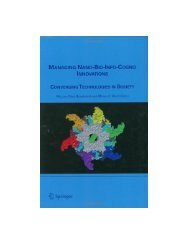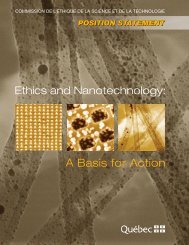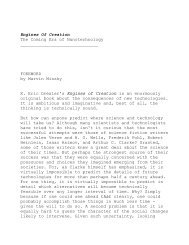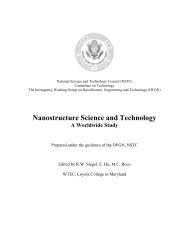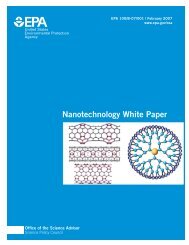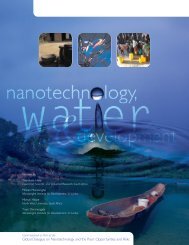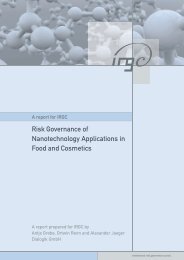Download - Nanowerk
Download - Nanowerk
Download - Nanowerk
Create successful ePaper yourself
Turn your PDF publications into a flip-book with our unique Google optimized e-Paper software.
The EU discussion and work in progress to regulate and develop privacy enhancing<br />
technologies must make good progress. There is a “need to incorporate ethical design<br />
from the start. This requires a multidisciplinary approach that involves not only scientists<br />
and technologists, but social scientists. For security RTD this is particularly important. …<br />
(There is a need for) the introduction of features in ubiquitous sensor networks to<br />
facilitate their removal when no longer required, and the enforcement of a minimum size”<br />
(Morrison, 2007).<br />
The real demand for new security technologies (whether nanotechnology based or not)<br />
and non-technical options must be articulated in a public stakeholder debate. In such a<br />
debate, there is a need “to effectively discriminate between measured security and<br />
perceived security” (Morrison, 2007).<br />
Care must be taken that new nanotechnology based security technologies respect<br />
existing legislation and civil rights. There is a “need to respect the autonomy of citizens<br />
and obtain consent with regard to protection of privacy, collection of data and its share<br />
for security purposes (anti-terrorism, judicial use, etc)” (Morrison, 2007).<br />
5.6 Conclusions<br />
In this chapter on societal implications of nanotechnology based security technologies,<br />
four questions have been discussed:<br />
1. What is the existing regulatory and ethical framework relevant to nanotechnology<br />
based security technologies?<br />
The Charter of Fundamental Rights of the European Union, several European directives,<br />
guidelines and international declarations cover legal and ethical aspects of<br />
nanotechnology based security technologies.<br />
The main issue currently in debate is a proper balance between the rights to liberty and<br />
to security. Legislation and ethical guidelines for the protection of private and family life,<br />
home and communications; personal data protection; and equality and nondiscrimination<br />
must be taken into account.<br />
For some applications, the right to physical and mental integrity; and prohibition of<br />
degrading or inhuman treatment are valid.<br />
All products must respect legislation aimed at protecting and enhancing environmental<br />
quality and consumer protection.<br />
Research must balance academic freedom with responsible science and technology<br />
development. This includes a new balance between openness and handling classified<br />
information for security technologies.<br />
2. What impact on ethics and human rights is expected from new nanotechnology<br />
based security technologies?<br />
At present, potential impacts of nanotechnology based security technologies are still<br />
unclear. Proponents of security research expect security improvements for the European<br />
citizen, but they do not give evidence to corroborate this expectation. The eroding<br />
boundary between civil and military research may lead to unexpected security risks.<br />
Academic freedom and free trade may be restricted progressively. Some security<br />
technologies may not respect privacy and personal data protection legislation.<br />
3. What is known about European public opinion of nanotechnology and of justice,<br />
freedom and security policies?<br />
Many Europeans are more concerned with security than with privacy and freedom,<br />
according to a number of Eurobarometer surveys, however public awareness of security<br />
measures, security technologies and nanotechnology is low. This means that no<br />
conclusions can be drawn from opinion poles about the acceptance of the security policies<br />
or technologies used or under development.<br />
56




